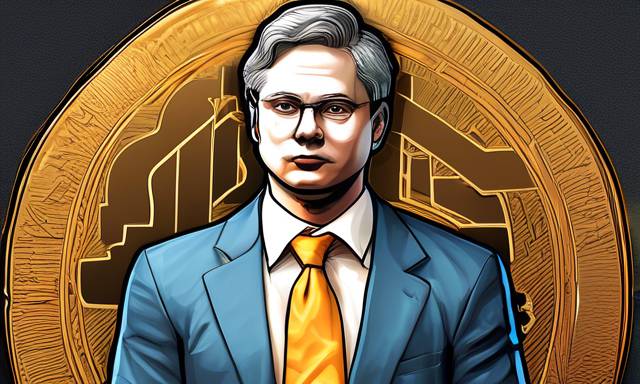Can Bitcoin’s Resilience Outshine Central Bank Narratives?
So, let’s dive into the recent developments surrounding Bitcoin and the critiques it faces, especially after the European Central Bank (ECB) published an anti-Bitcoin paper. You’ve probably seen headlines about Bitcoin’s volatility, the wealthy owning all the coins, or how, according to the ECB, it’s just a speculative bubble. But here’s the scoop, especially as someone navigating the crypto scene like myself.
Key Takeaways:
- The ECB’s negative portrayal of Bitcoin faces serious counterarguments.
- Bitcoin is decentralized; lobbying is largely irrelevant.
- Wealth concentration narratives misunderstand the market’s structure.
- Bitcoin plays a significant role in financial innovation.
- Technological advancements are enhancing Bitcoin’s usability as a payment method.
- CBDCs come with their own sets of risks compared to Bitcoin.
Now, recently, Dennis Porter, CEO of the Satoshi Action Fund, announced the publication of a rebuttal paper titled “Challenging Bias in the ECB’s Bitcoin Analysis.” This paper, co-authored by some notable figures, meticulously tears apart every major point made by the ECB. Why does this matter? Because it highlights not just Bitcoin’s value as a currency, but also as a tool for social and economic change, especially in regions that lack financial infrastructure.
To Lobby or Not to Lobby?
The ECB’s paper argues that the crypto industry’s lobbying efforts disproportionately influence regulatory policies. But wait—it’s actually the big banks holding the reins. In the U.S. alone, less than 1% of financial sector lobbying expenditures went to crypto-related efforts in 2023. How can an industry without a CEO, legal teams, or lobbyists exert power? The authors of the rebuttal emphasize Bitcoin’s decentralized nature. It’s not a corporation; it’s a global, leaderless protocol.
Emotionally engaging idea: Imagine a world where financial power is not concentrated in the hands of a few but is distributed amongst many. That’s the dream with cryptocurrencies, right?
Wealth Concentration: A Misunderstood Narrative
Another harsh criticism from the ECB states that Bitcoin ownership is concentrated in the hands of a select few. The rebuttal completely debunks this by arguing that major wallets often belong to exchanges like Coinbase and Binance, which handle millions of user accounts. Maybe we should think less about the few wealthy individuals and more about how many people they represent!
- Reflective point: Hasn’t the accessibility of Bitcoin changed the game for everyday folks?
Driving Financial Innovation
The ECB claims that Bitcoin lacks productive economic contributions. This is where the rebuttal shines. It points out that Bitcoin functions like the TCP/IP protocol for the Internet. It’s a backbone for new financial services, enabling lower transaction costs globally! In many developing countries, remittances through Bitcoin can significantly slash fees. For families relying on these funds, that could mean the difference between a decent meal and not eating at all.
The Redistribution Argument: A Free Market?
Another point the ECB raises is about wealth redistribution through Bitcoin’s rising prices, favoring early adopters. The rebuttal challenges the idea by stating that it fails to grasp the voluntary nature of participation in the Bitcoin market. Becoming part of this market isn’t a lottery; it’s about doing your homework, taking risks, and maybe getting lucky.
Just like in traditional investing—think about the early Facebook or Amazon investors—the risk is inherent. But the potential returns can be massive!
Intrinsic Value: Is There Such a Thing?
The ECB argues that Bitcoin lacks intrinsic value and points out flaws in how traditional asset valuation models apply to it. But, wait a sec! This contradicts the idea that all assets derive their value from use and scarcity. Bitcoin’s unique value proposition, much like gold, lies in its limited supply and decentralized construct.
Speculative Bubble or Transformational Technology?
The discussion about Bitcoin being a speculative bubble is quite fascinating. Yes, it’s volatile—so is the stock market! The key takeaway from the rebuttal is that Bitcoin’s price appreciation indicates its increasing adoption and utility. It’s not just some magic money trick; it’s based on real-world value that participants acknowledge.
- Practical Tip: For a potential investor, look beyond the price charts. Research how Bitcoin is being adopted in different sectors, how it’s solving real issues, and why it’s valued the ways it is.
Payment Systems: A Journey to Efficiency
The ECB mentions that Bitcoin hasn’t lived up to its potential as a global payment method. They cite high transaction fees and scalability problems. But don’t forget about the Lightning Network! This tech is absolutely transforming how Bitcoin can process payments quickly and at a much lower cost.
The CBDC Conundrum
The ECB proposes Central Bank Digital Currencies (CBDCs) as a better alternative. But here’s where it gets interesting—the risks associated with CBDCs can’t be ignored. Centralization could lead to a loss of privacy and financial freedom. Bitcoin’s decentralized architecture stands in stark contrast, promoting censorship resistance and financial sovereignty.
The authors of the rebuttal raise an eyebrow at the ECB’s bias too. They highlight potential conflicts of interest, given that the ECB authors are involved in the development of the digital euro, putting them directly at odds with Bitcoin’s interests.
Conclusion: Reflecting on Bitcoin’s Role in Tomorrow’s Economy
As Bitcoin trades around $66,465, it’s essential for potential investors—and even skeptics—to look deeper into the narratives surrounding it. It’s easy to get caught up in noise, but understanding the core arguments, the data, and the innovative power that Bitcoin embodies can significantly impact your investment outlook.
So, let me ask you: In a world where central control over finance is increasingly scrutinized, could Bitcoin truly be the beacon of hope many believe it is?





 By
By
 By
By

 By
By
